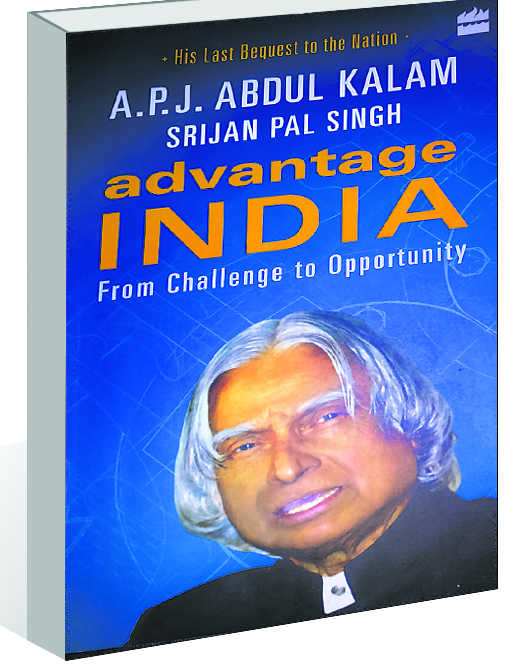Kuldip Singh Dhir
There will hardly be any Indian who hasn’t derived some inspiration from the life of Bharat Ratna APJ Abdul Kalam. Srijan Pal Singh, a gold medalist MBA from IIM Ahmedabad was an officer on special duty to the former President of India during the last six years of his life. Advantage India is their blueprint for creating a new India. The book is the outcome of their experiences and interactions with various stakeholders, including government functionaries, manufacturing industries, bureaucracy, environmentalists, social workers, spiritual leaders, educationists, healthcare institutes, business units and a general audience, all aspiring to contribute to the realisation of this dream.
The authors begin with some keen observations at a chance stoppage on a closed railway-crossing while going to attend National Children’s Science Congress in June 2014. They observe that even in a remote area cell phone could manage high speed internet with mobile GPS continuously keeping track of their route. The area around, a village named Badshahpur, meaning land of a king, presented a picture of India of today. Hoardings atop nearby shops wooed customers to use mobile money transfer services of M-Pesa and Airtel Money. At some distance were signboards reading Maruti Computer Training Centre and Sai Mobile Repair centre, a semiotic mix of the myth and modernity. Soon an electric train whizzed past. Powered by 10,000 volts of continuous supply, it represented the reach and reliability of one of the largest railway systems of the world. Not far away might be villages with little or no access to power.
The scenario at Badshahpur crossing presents a picture of real India that is a motley of tradition and modernity, and is anxious to keep pace with the times, full of challenges and possibilities. This book makes this attempt, blending the first author’s professional experience of more than seven decades in diverse roles including that of the President with the freshness of ideas of the co-author.
They recount the challenges India faced during the struggle for Independence and also take stock of the achievements, grey areas and the need for concrete strategy for a real breakthrough on every issue. For example, they reveal that our food situation was so dismal that four million Indians died of starvation, disease or suicide in 1943, just four years before the Independence. Fifty to 80 million people fell victim to famines during the Colonial rule that preceded. To meet the food deficit, we had to rely on PL 480, which meant bartering country’s self-respect and freedom of action. Our leadership changed things dramatically with green revolution and now the Food Security Act 2013 guarantees food grains for everybody. Bridging the rich-poor divide and making the country self-dependent, resisting arm-twisting tactics of world powers was the next big challenge. Fighting all odds, we have successfully developed heavy machinery, nuclear reactors, satellites, super computers, missiles, nuclear weapons, rocket launch vehicles and space probes. Education, health, knowledge resources, research and youth employment need urgent intervention.
Old knowledge is decaying at the rate of even 30 per cent in areas of technology and new knowledge is doubling almost every year. It is imperative to focus on preventive than curative healthcare. A pathology which is India-specific regarding disease and drug has to be supplemented with improved doctor-to-people ratio.
This blueprint suggests digital clouds for citizen database, e-health, open source education, navigation satellite system, e-commerce, judicial services, innovation and disaster management, to make full use of IT revolution. They put forward a strategic approach for a resilient corruption-free political system. This envisages electoral reforms like right to reject or recall, low electoral expenses, unbreakable promises in election manifestos and inculcation of ethics among all concerned.
How can we convert despair into hope, fear into belief, anxiety into ease, aversion into compassion has always been Kalam’s major concern. This unputdownable read is such that by the time one finishes it, one is convinced that India can be transformed into a developed nation. It is sad that instead of following his advice we have been beguiled by empty rhetoric and sectarian communal hotheads. We have disgraced him in his life time. It is time that we do not disgrace him anymore.
Unlock Exclusive Insights with The Tribune Premium
Take your experience further with Premium access.
Thought-provoking Opinions, Expert Analysis, In-depth Insights and other Member Only Benefits
Already a Member? Sign In Now










